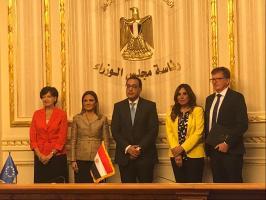The project will also contribute to the depollution of Lake Qarun, one of Egypt’s important natural landmarks with significant historical, natural and scientific importance. In addition, it will provide employment for skilled and unskilled workers in the region.
The project will be implemented in two phases during 2018-2025 and includes:
- construction of 8 new wastewater treatment plants (WWTPs)
- expansion of 9 existing WWTPs
- rehabilitation of 10 existing WWTPs
- construction of associated sewerage networks, including 139 new pumping stations, for currently unserved rural villages
- provision of on-site sanitation facilities and evacuation trucks for around 400,000 people.
The project is being co-financed together with the EBRD and the EU Neighbourhood Investment Facility (NIF), which is managed by the European Commission and will be contributing a substantial grant amount of €37 million to the project to fund both investments and technical assistance.
The EIB’s operations in Egypt are aimed at improving the resilience of the Egyptian economy by investing in priority sectors. In 2017, the EU bank provided finance of €472 million to support private sector development and vital infrastructure investments in the public sector in the country.

